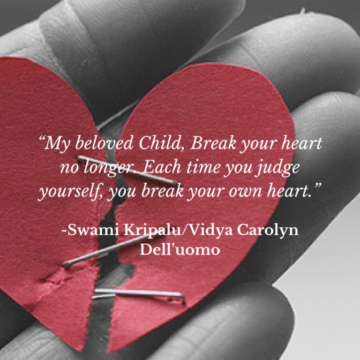
“My beloved Child, Break your heart no longer. Each time you judge yourself, you break your own heart.”
-Swami Kripalu/Vidya Carolyn Dell’uomo
How many hundreds of yoga classes did I teach, quoting my teacher at the end of each class, before my heart’s mind understood those words? Why did saying them to my students still bring tears to my eyes? Why, after years of meditation, therapy and medication, was I still so mean to me? Before I began a daily yoga practice in the late 80’s, no amount of meditation turned the volume down on that monster in my mind. Every one of us has an inner critic. Mark Twain said that if we talked to our children the way we talk to ourselves, we would be arrested for child abuse. I was particularly hard on myself in the 70’s, after my marriage failed. Had anyone been listening to my self-abuse, they would have locked me up and thrown away the key.
Whether the source of my shame was an internalized family legacy, early childhood interactions with my parents or past life karma, my secret name for myself was “Amy Shamey.” Shame wasn’t just a thought or belief. It wasn’t just an emotion. It was a part of my physical being, a daily visceral experience that whooshed through my body, bringing waves of heat and a deep sense of humiliation and with it, grief. No amount of talking about it in therapy, watching it arise on the meditation cushion, or numbing it out with meds, touched the core of my self-hatred. Of course, my body image had a lot to do with it. I saw myself as chubby, unattractive and clumsy, compared to my beautiful model mother, whose expressive face appeared on the covers of pulp fiction magazines like True Confessions and Romance in the late 1940’s. My body was not my friend. It had hair in places it shouldn’t. It had ungraceful hands. It had an embarrassing plumpness in the places that should have been lean and an embarrassing flatness in the places that should have been round. From this description, you might think I wasn’t pretty. We’re talking about self-image here, not reality. Pictures attest to my cuteness as a kid and my down right beauty in my teens. I don’t think my creative dance teacher would have tried to convince my mother when I was eleven to enroll me in a proper ballet studio with daily classes, if she hadn’t seen in me a grace and fluidity I couldn’t see in myself. But whatever the source, I hated my body and nearly everything else that went by the name of Amy.
So what changed? In the late 1980’s I made my first visit to Kripalu Center in Stockbridge, Massachusetts and took my first yoga class. I had been meditating since the early 70’s, and had practiced a bit of yoga asana with a library book. But it wasn’t until I was on a blanket at Kripalu for the first time, that a teacher invited me to listen to my body and accept it just as it was. It may have been during that first visit to Kripalu, that a teacher spoke the words attributed to Swami Kripalu but actually written by long-time Kripalu disciple and yoga teacher, Carolyn Dell’uomo: “My beloved Child, Break your heart no longer. Each time you judge yourself, you break your own heart.” I likely wept on my mat, when I heard them, although I don’t remember. What I do remember is emerging from the class feeling a sense of spacious abundance, a touching into wholeness that I had never experienced before. In those moments after class, it didn’t matter what I looked like or what mistakes I may have made in my life. I had touched something deep within me that was absolutely perfect, just as it was. In those moments after class, there was nothing I needed to fix, no way I needed to change. I left Kripalu with a bag full of audio tapes to practice at home, as there were no yoga teachers in my town. I came back to my mat, day after day, sometimes struggling to get there with a head full of self-condemnation. And after every morning practice, of stretching and breathing and staying present to the physical sensations the poses evoked, I felt more at home in my body. I rose from my mat feeling at ease with the Amy who looked back at me from the mirror.
At first the customary whoosh of shame came weekly, then monthly, and then eventually, it disappeared altogether. The simple attention to sensation, the backing off from a pose when I needed to, the true listening and honoring of my body, began to change me in the most profound way. Compassion for my body was the first thing to change. I paid attention to my need for sleep, for exercise, for when to eat and when to eliminate. Cravings for carbs diminished, and without dieting, I lost weight. Eventually, when my inner critic attacked, I found myself talking back, instead of believing everything she said. When I rolled out my mat to practice, her voice fell silent. When I made a mistake or fell short of my own expectations, she always had something to say, but I didn’t necessarily believe her anymore. By the early 90’s, I was teaching a workshop at Kripalu, called, “Befriending Your Inner Critic,” leading others in exercises to find that compassion for themselves, including their shame parts and their nasty inner critics. From that workshop, I offer you a practice now. Spend a week with this practice and watch your compassion for all your parts begin to outshine the weakening voice of your inner critic.
This involves a breathing exercise, a movement and a simple meditation technique adapted from an anonymous phrase in Christian liturgy. I lead this in a standing position, but it can be adapted to a chair practice. The breathing practice raises heart rate and oxygen intake, even as it invokes feelings of calm clarity and spaciousness upon completion. If you have not felt at home in your body for a while, you will after this exercise. There are a few contraindications for the breathing practice. Do not practice the Power Hara Breath if you have had recent abdominal surgery, untreated high blood pressure, or if you are pregnant.
Power Hara Breath
- Stand with your feet slightly wider than hip width apart and bring hands to your shoulders with your elbows pointed out like chicken wings.
- Inhale, filling your lungs halfway as you twist to the left.
- Inhale fully as you twist to the right.
- Extend your right arm forcefully to the left as you twist to the left, exhaling through your mouth with a vigorous “ha” sound.
- Extend your left arm forcefully to the right as you twist to the right, exhaling again through your mouth with a “ha” sound.
- Practice five to ten full rounds. Release and stand with your eyes closed and your palms open. Sense deeply into your face, feel the sensation in your face; your arms, the palms of your hands. Sense the tingling in your palms.
“Be still beloved, and know that you are safely held.”
- Let your right hand nest in her left hand with the tips of your thumbs touching and say to yourself “Be still, beloved hands and know that you are safely held.
- Bounce on your feet for about thirty seconds. Stop and feel the sensation in your feet. Say to yourself, “Be still, beloved feet and know that you are safely held.”
- Now find a comfortable seated position or lie down on the floor. repeat the phrase, moving through your body, like this: “Be still beloved __________,” as you inhale; “and know that you are safely held,” as you exhale.
- Begin with the left foot. “Be still beloved left foot,” as you inhale; “and know that you are safely held,” as you exhale. Repeat this phrase as you move up the left side of your body, all the way up to your crown. As you speak to your head, you might wish to place your hands on your head so your little fingers are touching at your hairline and your index fingers point to your crown.
- Do the same practice, beginning with the right foot and moving up the right side of your body.
- Speak to your torso, including your buttocks, genitals, belly, chest, spine, and breasts. Feel free to place your hands on each body part as you speak to it.
- End by placing your right hand on your heart, and your left hand on top, linking your thumbs in a hand gesture called garuda mudra. End with the phrase, “Be still beloved heart, and know that you are safely held.”
 For a practice that supports that strong inner, “Yes!” click here to purchase a copy of the Bhavana CD. To attend a LifeForce Yoga Workshop or Event, browse our Events Calendar to find something near you!
For a practice that supports that strong inner, “Yes!” click here to purchase a copy of the Bhavana CD. To attend a LifeForce Yoga Workshop or Event, browse our Events Calendar to find something near you!
